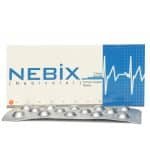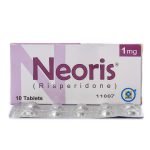delivery within 72 Hours
Nebix 5mg Tablet
₨ 406
Generic: Nebivolol
Pack Size: 14s
Product Form: Tablet
Delivery within: 2 to 3 working days across Pakistan
Shipping & Delivery
-
Courier delivery
Our courier will deliver to the specified address
2-3 Days
From Rs 250
-
Free 15-Day returns

Black Friday Blowout!
Description
Nebix 5mg Tablet is a medication containing Nebivolol, a beta-blocker used primarily for the management of hypertension (high blood pressure) and certain heart conditions. Nebivolol acts by blocking the action of adrenaline on beta receptors in the heart and blood vessels, resulting in reduced heart rate and vasodilation, which helps to lower blood pressure.
Uses:
Nebix 5mg Tablet is prescribed for the following conditions:
- Hypertension (High Blood Pressure): It is used as a first-line treatment to lower blood pressure and reduce the risk of cardiovascular events such as heart attack and stroke.
- Heart Failure: Nebix 5mg Tablet may be prescribed in combination with other medications for the treatment of chronic heart failure to improve symptoms and reduce hospitalizations.
- Angina Pectoris: It may be used to manage stable angina (chest pain) by reducing the workload on the heart and improving blood flow to the heart muscle.
Side Effects:
While Nebix 5mg Tablet is generally well-tolerated, it may cause some side effects in certain individuals, including:
- Fatigue or Weakness: Some patients may experience tiredness or weakness, especially at the beginning of treatment.
- Dizziness or Lightheadedness: Nebivolol may cause a drop in blood pressure upon standing, leading to dizziness or lightheadedness.
- Headache: Mild to moderate headaches may occur, particularly during the initial stages of treatment.
- Bradycardia (Slow Heart Rate): Nebivolol may reduce heart rate, which can cause symptoms such as palpitations, shortness of breath, or fainting.
- Cold Extremities: Some individuals may notice cold hands or feet due to the peripheral vasoconstrictive effects of beta-blockers.
Precautions:
Before taking Nebix 5mg Tablet, consider the following precautions:
- Medical History: Inform your doctor about any medical conditions, especially if you have a history of heart disease, asthma, bronchospasm, or diabetes.
- Pregnancy and Lactation: Consult your doctor before using Nebix 5mg Tablet if you are pregnant, planning to conceive, or breastfeeding.
- Driving and Operating Machinery: Nebivolol may cause dizziness or fatigue, which can impair your ability to drive or operate machinery. Use caution until you know how the medication affects you.
- Alcohol and Other Drugs: Avoid excessive alcohol consumption while taking Nebix 5mg Tablet, as it may potentiate the effects of the medication on blood pressure and heart rate.
When Not to Use:
Nebix 5mg Tablet should not be used in the following situations:
- Hypersensitivity: Do not use if you are allergic to Nebivolol or any other ingredients in the medication.
- Severe Bradycardia or Heart Block: Avoid use in patients with severe bradycardia (slow heart rate) or heart block (conduction abnormalities) unless a pacemaker is in place.
- Uncontrolled Heart Failure: Nebivolol should not be initiated or continued in patients with decompensated heart failure requiring intravenous inotropic therapy.
FAQ:
- How should Nebix 5mg Tablet be taken?
- The usual recommended dosage is one tablet daily, with or without food, or as directed by your doctor. Do not exceed the prescribed dose without consulting your healthcare provider.
- How long does it take for Nebix 5mg Tablet to start working?
- Nebix 5mg Tablet may start lowering blood pressure within a few hours of the first dose, but it may take several weeks to achieve maximal therapeutic effect.
- Can Nebix 5mg Tablet be stopped abruptly?
- Abrupt discontinuation of Nebix 5mg Tablet may lead to rebound hypertension or worsening of heart failure symptoms. It is important to taper off the medication gradually under medical supervision.
- Are there any dietary restrictions while taking Nebix 5mg Tablet?
- There are no specific dietary restrictions associated with Nebix 5mg Tablet. However, it is advisable to maintain a healthy diet low in sodium and saturated fats to optimize blood pressure control and overall cardiovascular health.
- Can Nebix 5mg Tablet be used in children?
- Nebix 5mg Tablet is not recommended for use in children due to limited safety and efficacy data in pediatric populations. Use in children should be determined by a pediatric cardiologist or pediatrician.
Customer Reviews
You must be logged in to post a review.










Reviews
Clear filtersThere are no reviews yet.